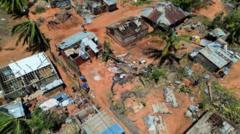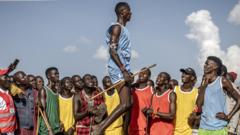The Vatican, aligning with several conservative nations, has stalled negotiations on women's rights at the UN climate summit by opposing terms related to gender. Critics argue that this decision threatens vital support for women, who face disproportionate impacts from climate change.
Vatican's Opposition to Gender Rights Impacts Women at COP29 Climate Talks

Vatican's Opposition to Gender Rights Impacts Women at COP29 Climate Talks
The Vatican's recent stance against discussions on gender rights at the COP29 climate summit raises concerns over the support for women affected by climate change.
The Vatican has emerged as a significant blocker in discussions over women's rights at the UN COP29 climate conference amid a wider controversy concerning gender and LGBTQ+ rights. Reports from BBC News indicate that Pope Francis' representatives, led by Secretary of State Pietro Parolin, have joined forces with countries such as Saudi Arabia, Russia, Iran, and Egypt to obstruct a proposed deal intended to bolster support—particularly financial assistance—for women leading the charge against climate change. Colombia’s environmental minister Susana Muhamad expressed frustration over the stalled discussions, emphasizing the urgent need for a resolution, given that women and girls make up an estimated 80% of those displaced by climate impacts.
The negotiations at COP29, currently taking place in Azerbaijan, aimed to update the Lima Work Programme on Gender, a framework established more than a decade ago to ensure climate initiatives consider the unique experiences of women by directing resources towards them. However, the Vatican and the aforementioned countries are reportedly resisting any mentions of "gender," primarily due to concerns regarding the inclusion of transgender women's rights and references to gay women, significantly hindering progress on addressing women's access to climate support.
Aid organizations, including ActionAid, stress that a failure to achieve an agreement on this front could have disastrous repercussions for women disproportionately affected by climate crises. The UN Women organization projects that by 2050, almost 240 million women and girls will face food insecurity due to climate impacts, a stark contrast to 131 million men and boys. Additionally, it is noted that a staggering 0.01% of global climate financing currently supports projects that incorporate women's needs and experiences.
As the negotiations evolve, there are calls from Latin American and European countries to acknowledge the diversity of women's experiences regarding climate change, highlighting that factors like age, race, and sexuality play crucial roles. Nevertheless, the coalition of countries opposing gender-focused language remains resolute, much to the surprise of observers who noted that these nations previously showed no objection to the inclusion of the term over the past decade.
Charity representatives have voiced their heartbreak over the Vatican's involvement. Mwanahamisi Singano, a lead policy expert, noted that countries like Iran cite legal prohibitions against homosexuality as grounds for rejecting any references to LGBTQ+ identities. Aid organizations warn of the potential collapse of initiatives aimed at supporting women's rights and needs, particularly given the impending expiration of the current UN gender program.
The Vatican has maintained its position regarding traditional marriage definitions and remains opposed to various progressive reforms related to gender identity and rights. Community advocates are now concerned that dwindling female participation in negotiations—only 36% of negotiators at last year's conference were women—compounds the risk of overlooking the realities faced by women in climate-disrupted areas.
A recently published letter by the EU, supported by 17 countries, underscores the belief that empowering women and girls is essential in tackling the climate crisis. With the conference nearing its conclusion, many voices are calling for the integration of human rights perspectives into climate discussions, urging leaders to prioritize the support of vulnerable populations affected by climate change.
The negotiations at COP29, currently taking place in Azerbaijan, aimed to update the Lima Work Programme on Gender, a framework established more than a decade ago to ensure climate initiatives consider the unique experiences of women by directing resources towards them. However, the Vatican and the aforementioned countries are reportedly resisting any mentions of "gender," primarily due to concerns regarding the inclusion of transgender women's rights and references to gay women, significantly hindering progress on addressing women's access to climate support.
Aid organizations, including ActionAid, stress that a failure to achieve an agreement on this front could have disastrous repercussions for women disproportionately affected by climate crises. The UN Women organization projects that by 2050, almost 240 million women and girls will face food insecurity due to climate impacts, a stark contrast to 131 million men and boys. Additionally, it is noted that a staggering 0.01% of global climate financing currently supports projects that incorporate women's needs and experiences.
As the negotiations evolve, there are calls from Latin American and European countries to acknowledge the diversity of women's experiences regarding climate change, highlighting that factors like age, race, and sexuality play crucial roles. Nevertheless, the coalition of countries opposing gender-focused language remains resolute, much to the surprise of observers who noted that these nations previously showed no objection to the inclusion of the term over the past decade.
Charity representatives have voiced their heartbreak over the Vatican's involvement. Mwanahamisi Singano, a lead policy expert, noted that countries like Iran cite legal prohibitions against homosexuality as grounds for rejecting any references to LGBTQ+ identities. Aid organizations warn of the potential collapse of initiatives aimed at supporting women's rights and needs, particularly given the impending expiration of the current UN gender program.
The Vatican has maintained its position regarding traditional marriage definitions and remains opposed to various progressive reforms related to gender identity and rights. Community advocates are now concerned that dwindling female participation in negotiations—only 36% of negotiators at last year's conference were women—compounds the risk of overlooking the realities faced by women in climate-disrupted areas.
A recently published letter by the EU, supported by 17 countries, underscores the belief that empowering women and girls is essential in tackling the climate crisis. With the conference nearing its conclusion, many voices are calling for the integration of human rights perspectives into climate discussions, urging leaders to prioritize the support of vulnerable populations affected by climate change.



















